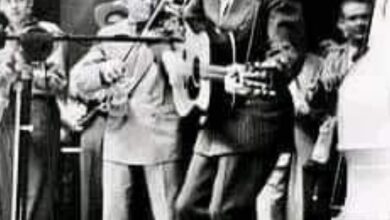We Love That Young People Realize Patsy’s Divine Talent, Unlike Today’s Artists’ Music in 60 Years
Patsy Cline, born Virginia Patterson Hensley in Winchester, Virginia, on September 8, 1932, possessed a voice that would become synonymous with the emotional depth and vulnerability of classic country music. Raised in a working-class family, Cline’s musical talent was evident from a young age, and she began performing in local venues as a teenager. Her early influences included country artists like Hank Williams and Roy Acuff, whose storytelling and emotive singing style left a lasting impression on her own musical development.
Cline’s breakthrough came in the late 1950s when she signed with Four Star Records and started releasing singles that showcased her unique vocal prowess. Songs like “Walkin’ After Midnight” and “I Fall to Pieces” established her as a rising star in the country music scene, blending traditional country sounds with a crossover appeal that attracted a diverse audience.
However, it was her recording of Willie Nelson’s “Crazy” in 1961 that solidified Cline’s status as a legendary figure in country music. Initially hesitant about the song’s unconventional phrasing, Cline’s producer Owen Bradley convinced her to embrace its haunting melody and poignant lyrics. Recorded at Bradley’s Quonset Hut Studio in Nashville, Tennessee, “Crazy” captured Cline’s ability to convey raw emotion, even as she was recovering from injuries sustained in a serious car accident earlier that year. Despite physical pain, her performance on “Crazy” resonated with listeners, showcasing her ability to imbue songs with deep emotional resonance.
Released by Decca Records in October 1961, “Crazy” quickly ascended the charts, peaking at number two on the Billboard Hot Country Singles chart and making a significant impact on the pop charts as well, where it reached number nine. The song’s success underscored Cline’s crossover appeal and solidified her reputation as one of the foremost interpreters of heartfelt ballads in country music history.
Tragically, Patsy Cline’s promising career was cut short on March 5, 1963, when a plane carrying her and fellow country stars Cowboy Copas and Hawkshaw Hawkins crashed near Camden, Tennessee, claiming all onboard. Cline was only 30 years old at the time of her death, leaving behind a legacy that continues to resonate decades later.
Beyond “Crazy,” Cline’s discography includes numerous other iconic songs that showcase her vocal range and storytelling abilities. Tracks like “Sweet Dreams,” “She’s Got You,” and “Faded Love” further exemplify her ability to evoke deep emotions and connect with audiences on a personal level. Her influence extends beyond her own recordings; her impact on subsequent generations of country artists is profound, with many citing her as a major inspiration.
In recognition of her enduring legacy, Patsy Cline was posthumously inducted into the Country Music Hall of Fame in 1973. Her music remains a staple on radio playlists and continues to be covered by contemporary artists across genres, a testament to the timelessness of her voice and the enduring power of her songs to evoke emotion and resonate with listeners worldwide.





